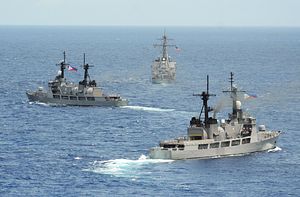On February 19, the Philippine Senate began an inquiry into a fierce controversy that has erupted over the country’s acquisition of new frigates from South Korea, one of the most expensive line items in its ongoing military modernization. The inquiry, which has attracted nationwide media coverage, reflects scrutiny among opponents over President Rodrigo Duterte and his administration’s management of the country’s defense.
As I have noted before in these pages, the Philippines is currently in the process of modernizing its military, and the Armed Forces Modernization Act initiated under former president Benigno Aquino III and continued under Rodrigo Duterte divides military modernization into three horizons and phases which run up to 2028 (See: “What’s Next For Philippine Military Modernization Under Duterte?”). Though certain aspects of the modernization effort have been progressing as expected, there are still a range of familiar challenges that remain, from delays and irregularities in the procurement process to shifting priorities that can affect the defense budget.
One of the biggest line items under that modernization effort was the Frigate Acquisition Project (FAP), where the Philippine Navy (PN) was to receive two frigates from South Korean shipyard Hyundai Heavy Industries (HHI). The bidding was opened back in 2013 during the Aquino years but the award for a 15.7 billion peso contract was issued to HHI under the Duterte administration back in September 2016.
The program has subsequently been mired in controversy which deepened towards the end of last year. PN chief Vice Admiral Ronald Mercado was removed from his post in December, allegedly over his opposition to the selection of the combat management system (CMS) from Hanwha Thales of South Korea over Tacticos Thales of the Netherlands to be integrated into the two frigates. Allegations had also surfaced about irregularities that implicated Christopher “Bong” Go, a special assistant to Duterte. Go was accused of interfering with the acquisition of the frigates and the selection of the combat management system.
On February 19, the Philippine Senate began a congressional inquiry following an investigation initiated by opposition lawmakers. Go once again protested his innocence, saying that he did not favor one system over another and that it had already been a “done deal” during the end of the Aquino administration. Meanwhile, Mercado also denied allegations that he had pushed for Tacticos Thales or that Go had interfered in the process.
Several cabinet members from the Duterte administration also attended the inquiry, which spokesperson Harry Roque said was meant to show support and solidarity for Go as well as to communicate that the administration had nothing to hide. Roque said the administration continued to refute the allegations. Irrespective of how things play out, what is clear is that the frigate controversy has exposed the same old problems that continue to delay the country’s acquisition of assets it urgently needs.
































